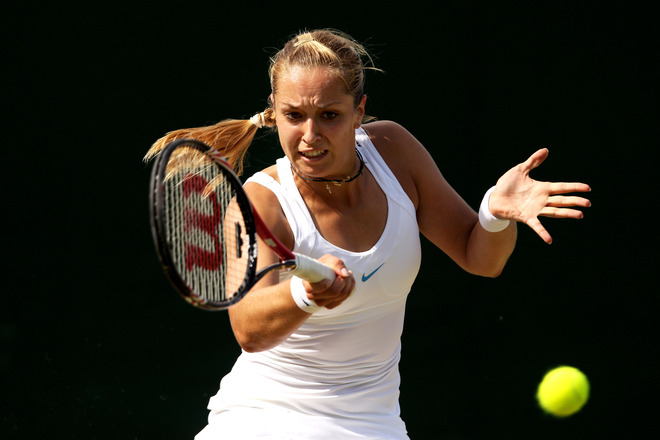By Thomas Swick
I really didn’t get into Wimbledon until Thursday afternoon, when I was sitting in the last row of a Continental plane flying from Fort Lauderdale to Newark. On the small screen in front of me I watched Jo-Wilfried Tsonga and Grigor Dimitrov play a match so spirited that at the conclusion of one point they found themselves on the same side of the net. (They honored the occasion, and each other, by exchanging low fives). Then Tsonga concluded the match by jumping over the net (a rare sight these days, but, then, this is the tournament of tradition) to console the laid-flat Bulgarian.
The other memorable match watched at 30,000 feet was Sabine Lisicki’s defeat of Na Li. If Wide World of Sports were still around they could ditch the footage of the tumbling ski jumper and illustrate the thrill of victory and the agony of defeat with two shots of Lisicki: the first, showing her falling to her knees and bowing her head to the grass in exultant ecstasy, and the second, from a few weeks ago, showing her in tears as she gets carried off the red clay of Roland Garros on a stretcher. The redemptive power of sports.
This is not to say the first few days were without interest. There was the ball that bounced directly off the head of a lines judge and over the wall. There was Ryan Harrison finally putting his shirt on correctly and then giving himself a wry fist pump. There was Chris Evert telling, in his presence, of a borderline obsession with Roger Federer, and Patrick McEnroe confessing that, at Stanford, he took “Physics for Poets.” (Which is much more respectable than “Physics for Jocks.”) Pam Shriver, during a discussion of the coveted Wimbledon towels, said that she saw Serena Williams blow her nose in one.
Shriver has had perhaps the best line of the tournament so far. During the Maria Sharapova-Klara Zakopalova match, the conversation came around to what a difficult game tennis is, with each player out there alone, without teammates or coach. Shriver, not totally convinced, asked, “But where else could someone named Koukalova-Zakopalova make a million dollars?”
I flew north to attend a family wedding, and each morning I would turn on the motel TV to watch Wimbledon. This meant that I also heard the commentary of a non-tennis fan: my wife. When one of the talking heads, perhaps Brad Gilbert, described Harrison as someone who “loves to compete” and “hates to lose,” Hania asked reasonably: “And the other players hate to compete and love to lose?”
We flew home on Sunday, Wimbledon’s day off. At the airport, we struck up a conversation with a Norwegian family traveling from Oslo to their second home in Pompano Beach. The nine-year-old boy was a budding tennis player (with a Swedish coach), hoping to work on his game in the Florida sun. I asked him who his favorite player was. And the poised, soft-spoken, well-coiffed little Scandinavian said, not surprisingly: “Roger Federer.” Then his mother asked me which channel was showing Wimbledon.

